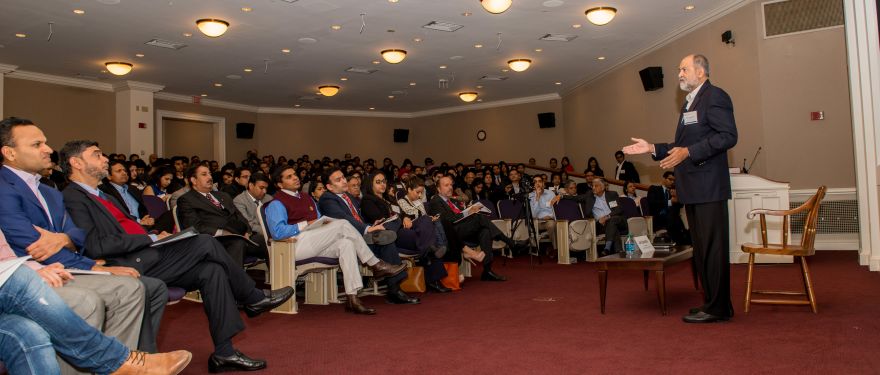The India conference is an annual event organized by Harvard students. The conference has in the past focused on a plethora of issues related to India. Though the structure of the conference has remained constant in the past, the content was always fine-tuned to reflect the relevant sentiment in India at the time of the event.
This year, the Harvard Business School and Harvard Kennedy School hosted over 75 speakers and 600 attendees over two days in early March. The event was kicked off on the 7th of March with an exciting debate focused on New Politics in the age of new Media between Mr. Ram Madhav (General Secretary BJP) and Mr. Prithvi Raj Chavan (Ex. Chief Minister of Maharashtra). Mr. Madhav, spoke about how the BJP was able to effectively use new social media platforms to not only gauge but also engage with the relevant electorates. While Mr. Prithvi Raj Chavan acknowledged the need to tweak the Indian National Congress’s own communication strategy, considering the 2014 election results, he warned that “if the secular character of the country was disturbed that all bets were off”. This year’s conference was titled India’s path to global leadership. The title was intentionally meant to be audacious. We (co-chairs of the conference) felt that it deeply resonated with us as it aptly reflected our own sense of optimism. We wanted the conversations for this year to be not so much about the decimal points but more about the big picture. We wanted the panelists, attendees and organizing team to dream big when it came to India and her future.
The first day of the conference covered many panels including India’s security challenges, skill development programs, smart city plans, education, liberalization of legal and arbitration services, and environmental sustainability. The day ended with an excellent keynote panel on women’s empowerment in emerging India with Rahul Bose, Kiran Bedi and Renana Jhabvala as the panelists. Mr. Sajjan Jindal, MD & Chairman of the JSW Group with the opening keynote kicked off the conference for the second day. Mr. Jindal spoke about this unique time period and opportunity for India post the 2014 elections. He elaborated on how the foreign investors are focused on India considering the various issues facing the other BRIC countries and the urgency for credible reform. He also pointed out the radical shift in Indian politics, with caste-based politics being replaced with development-oriented agendas. Mr. Adil Zainulbhai, Chairman Quality Council of India through his keynote to a packed Spangler Auditorium at the business school, highlighted the importance and success of the Swachh Bharat campaign. He discussed how such a campaign had helped to create awareness in society and motivate people in creating a cleaner India.
The sense of optimism among the members of the various technology and ecommerce panels was palpable. Mr. Rahul Narvekar, CEO Indianroots, fittingly described the ecommerce sector, and the emerging startup ecosystem in general in India, as one that is rapidly learning, adapting and surviving. He emphasized the need for a single-minded focus on execution and reacting deftly to succeed in such frontier and nascent businesses. Mr. Rahul Anand, CEO Hopscotch, also spoke about the need for Indian startups to do things differently and to be wary of using cookie cutter business models that may have worked in the United States and Europe. These young CEOs exuberated a sense of urgency and confidence that seemed to define the new India. In spite of archaic government laws, and various idiosyncrasies related to the Indian consumer, these were men and women who strongly believed in their own ability to shape the future by remaining nimble and focused.
Mr. R. Gopalakrishnan, Non-Executive Director, Tata Sons delivered the closing keynote. Mr. Gopalakrishnan engaged in a witty, and unorthodox discussion, opening his speech stating how he believed that India was the “Benjamin Button of the world”. He spoke of an India with over 2000 years of history and culture, with a relatively young heart as a 60-year-old democracy and a 20-year-old capitalist economy. He highlighted how there was Indianness before an India was there. In many ways, it was a fitting closing to two days of discussions about India since it spoke about some of the concerns related to the cultural and social fabric of India but more importantly it left the audience with some pertinent questions to think about when it came to what a new India should look like.
Continue the conversation on #pathtoleadership #ich2015
- Cherian Kurien, MBA 2015







